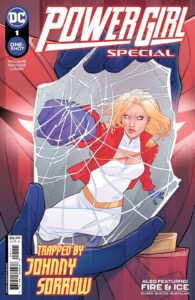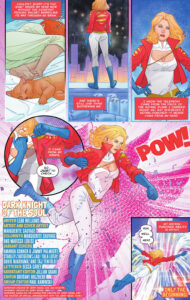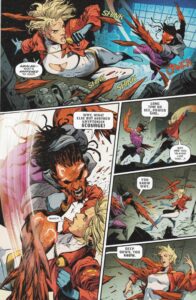Power Girl Special and Power Girl #1 & 2
Reviewed by Will Morgan 10-Nov-23
Power failure. This is… ordinary. Beige, rather than Paige. It’s flat and plain, and a flat and plain Power Girl is, as any fool knows, an abomination in the eyes of fandom.
 Power Girl Special and Power Girl #1 & 2, by Leah Williams, Margeuerite Sauvage and Eduardo Pansica (DC)
Power Girl Special and Power Girl #1 & 2, by Leah Williams, Margeuerite Sauvage and Eduardo Pansica (DC)
During the late 1970s and most of the 1980s, the popularity of Power Girl was such that she and her fellow Justice Society member Huntress totally eclipsed their Earth-One counterparts Supergirl and Batgirl, reducing them to third-tier players on the DC stage. The popularity of the traditional DC distaff counterparts has restored Supergirl and Batgirl to prominence—helped by a multitude of media appearances since the 1990s onwards—and as a consequence, since the events of Crisis On Infinite Earths, Power Girl has just sort of hung around, surplus to requirements and making little impact, apart from the short-lived but glorious 2011 Amanda Conner/Jimmy Palmiotti series. Nevertheless, there still seems to be some affection for her, and lately DC has given our back-up Girl of Steel another go-round… except, they haven’t really.
DC opened with a 60-page one-off featuring a completely unrecognizable character using the name Power Girl, who kicked off the issue hanging around in some dream world generated by the villainous Johnny Sorrow, with someone who at first I thought was the Bendis/LSH version of Rose & the Thorn, but turns out to be Lilith, the intermittently psychic Teen Titan of years ago, best remembered from her debut as uttering endless variations on ‘Ooh, I don’t really know…’; a curvy teenage Mavis Wilton in the making. How PG and Lilith became besties is never detailed in this supposedly ‘introductory’ one-shot which, I naively assume, was intended to give new readers a jumping on point.
Except it doesn’t. Our heroines’ presence in this phantom world is never fully explained, having presumably been presented in up to a dozen Superman books up to this point; and their means of finally escaping and reuniting with the rest of the Superman family is taken straight out of the America Chavez playbook, i.e. punching through dimensions until they hit the right one!
 The only thing that becomes clear is that DC have dismantled Power Girl as we knew her. Now, instead of Karen Starr, her civilian identity is apparently Paige, she works at the Daily Planet, and all the edges that made her distinguishable from your basic Supergirl have been sanded away.
The only thing that becomes clear is that DC have dismantled Power Girl as we knew her. Now, instead of Karen Starr, her civilian identity is apparently Paige, she works at the Daily Planet, and all the edges that made her distinguishable from your basic Supergirl have been sanded away.
The appeal of the original Power Girl—okay, other than the implausible behooterage, but she was first visualised by Wally Wood, so that came with the package—was that she was short-tempered and moody, she was flawed, she could be overbearing, she proved you didn’t have to necessarily be a nice person to be a good person. This version’s a physical powerhouse, but in terms of personality, she’s a three-week old wet lettuce.
 The one-off special is prettily illustrated; Marguerite Sauvage can’t do ugly work, but it’s all a bit wispy and misty and pastel, not giving any hint of the vitality traditionally associated with most previous incarnations of Peege. Leah Williams’ script also fails to imbue the character with any interest, any drive, any forcefulness.
The one-off special is prettily illustrated; Marguerite Sauvage can’t do ugly work, but it’s all a bit wispy and misty and pastel, not giving any hint of the vitality traditionally associated with most previous incarnations of Peege. Leah Williams’ script also fails to imbue the character with any interest, any drive, any forcefulness.
Williams continues on PG’s new ongoing title, and in the first two issues conspicuously fail to provide anything other than generic super-chick stuff. Power Girl attends a charity event in her civilian identity—one of them, she seems to have a set—meets a handsome stranger with a hidden agenda, battles a space pirate; but it’s all by the numbers. Williams clearly isn’t very interested , and consequently neither are we. Eduardo Pansica replaces Sauvage on the ongoing title, and performs adequately, in the vaguely spiky style popular in modern comics.
It’s a pity; Power Girl has a built-in fanbase, but I fail to see the point of promoting a version of the character so very far removed from everything that made her appeal to readers in the first place. This is… ordinary. Beige, rather than Paige. It’s flat and plain, and a flat and plain Power Girl is, as any fool knows, an abomination in the eyes of fandom.
Tags: DC Comics, Lilith, Omen, Power Girl